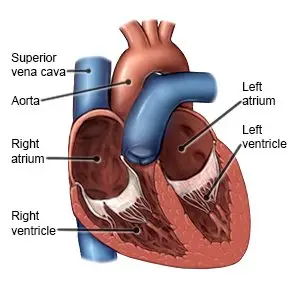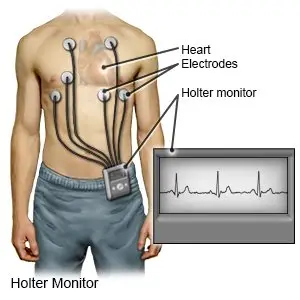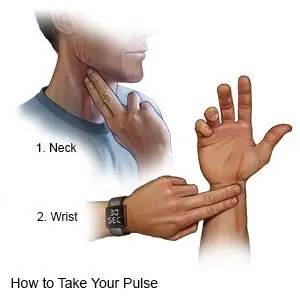What is atrial flutter?
Atrial flutter is an irregular heartbeat. It reduces your heart's ability to pump blood, which means you do not get enough oxygen. An irregular heartbeat could lead to a life-threatening blood clot or stroke.
 |
What increases my risk for atrial flutter?
- High blood pressure
- Heart failure, heart surgery, or other heart conditions
- Age 65 years or older
- A blood clot in your lungs
- Thyroid disease, obesity, or diabetes
- Heavy alcohol use
- Certain medicines, such as some antidepressants, bronchodilators, and cancer medicines
What are the signs and symptoms of atrial flutter?
- Pounding or racing heartbeat
- Chest pain
- Shortness of breath
- Weakness or tiredness
- Lightheadedness, dizziness, or fainting
How is atrial flutter diagnosed?
Your healthcare provider will ask about your symptoms and if they come and go. He or she will measure your heart rate. Tell him or her what health conditions you have and what medicines you take. He or she will also ask if you smoke, drink alcohol, or use any illegal drugs. You may need any of the following tests:
- An EKG records your heart rate and rhythm. You may also need to wear a Holter monitor while you do your normal activities. The Holter monitor is a portable EKG.

- Blood and urine tests check for infection, thyroid function, and potassium and calcium levels.
- A chest x-ray checks for infection or others problems in your heart and lungs.
- An echocardiogram is a type of ultrasound. Sound waves are used to show the structure and function of your heart.
How is atrial flutter treated?
- Heart medicines help control your heart rate and rhythm.
- Blood thinners help prevent blood clots. Clots can cause strokes, heart attacks, and death. Many types of blood thinners are available. Your healthcare provider will give you specific instructions for the type you are given. The following are general safety guidelines to follow while you are taking a blood thinner:
- Watch for bleeding and bruising. Watch for bleeding from your gums or nose. Watch for blood in your urine and bowel movements. Use a soft washcloth on your skin, and a soft toothbrush to brush your teeth. This can keep your skin and gums from bleeding. If you shave, use an electric shaver. Do not play contact sports.
- Tell your dentist and other healthcare providers that you take a blood thinner. Wear a bracelet or necklace that says you take this medicine.
- Do not start or stop any other medicines or supplements unless your healthcare provider tells you to. Many medicines and supplements cannot be used with blood thinners.
- Take your blood thinner exactly as prescribed by your healthcare provider. Do not skip does or take less than prescribed. Tell your provider right away if you forget to take your blood thinner, or if you take too much.
- Cardioversion is a procedure to return your heart rate and rhythm to normal. This is done with medicine or an electrical shock.
- Cardiac ablation is a procedure that uses heat energy to correct your irregular heartbeat. Ask for more information on cardiac ablation.
- Surgery may be needed to put in a pacemaker or an implanted cardioverter defibrillator (ICD). These will help control your heart rate and rhythm.
Treatment options
The following list of medications are in some way related to or used in the treatment of this condition.
- diltiazem
- Multaq
- flecainide
- Tambocor
- Brevibloc
View more treatment options
How can I manage atrial flutter?
- Know your target heart rate. Learn how to take your pulse and monitor your heart rate.

- Manage other health conditions. This includes high blood pressure or cholesterol, sleep apnea, diabetes, and other heart conditions. Take medicine as directed and follow your treatment plan. Your healthcare provider may need to change a medicine you are taking if it is causing your atrial flutter. Do not stop taking any medicine unless directed by your provider.
- Do not smoke. Nicotine and other chemicals in cigarettes and cigars can cause heart and lung damage. Ask your healthcare provider for information if you currently smoke and need help to quit. E-cigarettes or smokeless tobacco still contain nicotine. Talk to your healthcare provider before you use these products.
- Know the risks if you choose to drink alcohol. Alcohol can increase your risk for atrial flutter or make it harder to manage. Ask your healthcare provider if it is okay for you to drink any alcohol. He or she can help you set limits for the number of drinks you have in 24 hours and in a week. A drink of alcohol is 12 ounces of beer, 5 ounces of wine, or 1½ ounces of liquor.
- Eat heart-healthy foods. Heart healthy foods will help keep your cholesterol low. These include fruits, vegetables, whole-grain breads, low-fat dairy products, beans, lean meats, and fish. Replace butter and margarine with heart-healthy oils such as olive oil and canola oil.

- Maintain a healthy weight. Ask your healthcare provider what a healthy weight is for you. Ask him or her to help you create a weight loss plan if you are overweight.
Call your local emergency number (911 in the US) or have someone call if:
- You have any of the following signs of a heart attack:
- Squeezing, pressure, or pain in your chest
- You may also have any of the following:
- Discomfort or pain in your back, neck, jaw, stomach, or arm
- Shortness of breath
- Nausea or vomiting
- Lightheadedness or a sudden cold sweat
- You have any of the following signs of a stroke:
- Numbness or drooping on one side of your face
- Weakness in an arm or leg
- Confusion or difficulty speaking
- Dizziness, a severe headache, or vision loss
- You feel lightheaded, are short of breath, and have chest pain.
- You cough up blood.
When should I seek immediate care?
- Your arm or leg feels warm, tender, and painful. It may look swollen and red.
When should I call my doctor?
- Your heart rate is higher or lower than your healthcare provider says it should be.
- You are bruising and bleeding more easily.
- You have questions or concerns about your condition or care.
Care Agreement
You have the right to help plan your care. Learn about your health condition and how it may be treated. Discuss treatment options with your healthcare providers to decide what care you want to receive. You always have the right to refuse treatment. The above information is an educational aid only. It is not intended as medical advice for individual conditions or treatments. Talk to your doctor, nurse or pharmacist before following any medical regimen to see if it is safe and effective for you.© Copyright Merative 2023 Information is for End User's use only and may not be sold, redistributed or otherwise used for commercial purposes.




